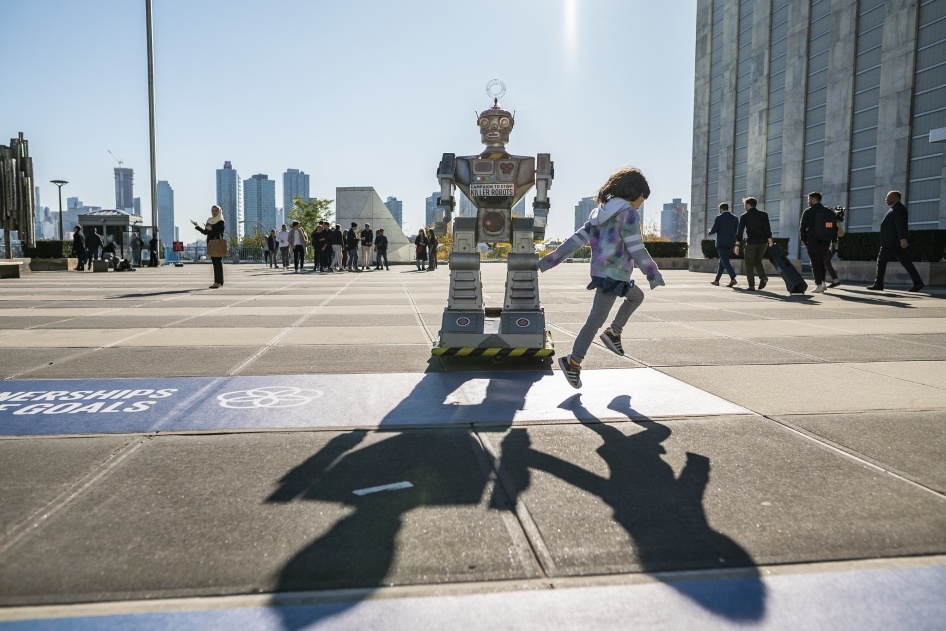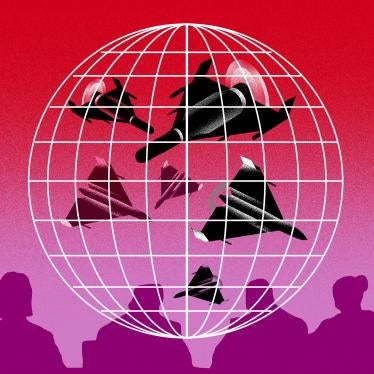By Tony Fortin, Research Officer, Observatoire des armements;
Bénédicte Jeannerod, France Director, Human Rights Watch;
Manuel Patrouillard, Executive Director, Handicap International;
Jean-Claude Samouiller, President, Amnesty International France;
Members of the Campaign to Stop Killer Robots.
An overwhelming majority of countries [152], including France, voted on December 22 in favor of the first United Nations General Assembly resolution on autonomous weapons.
The resolution acknowledges the “serious challenges and concerns” raised by “new technological applications in the military domain, including those related to artificial intelligence and autonomy in weapons systems.” It could pave the way for a treaty to ban and regulate autonomous weapons systems, something that many countries are calling for. France should seize this opportunity and play a leading role in this process.
There is an urgent need for the international community to deal with the dangers raised by removing human control from the use of force. Autonomous weapons systems threaten our humanity and the fundamental principles of international law.
Autonomous weapons are systems that, once activated, select and apply force to targets based on sensor processing rather than human inputs.
Leaving the choice of killing to machines crosses a moral and ethical red line since an algorithm is imperfect and incapable of apprehending the value of human life. It is by no means clear that artificial intelligence can respect international law, in particular the distinction between combatants and non-combatants.
Civilians would be the victims. Violations of war committed in the current conflicts in Ukraine, Israel-Palestine and Sudan are resulting in the loss of countless civilian lives. Autonomous weapons systems would make warfare even more dehumanizing and deadly for civilians.
Autonomous weapons present a terrifying security threat. They can be deployed on a large scale, without soldiers –at low cost but massive impact. To allow them to proliferate would also run the risk that armed groups who already respect none of the rules of warfare would be able to get them. And they could be pirated and turned against the countries that developed them.
Since May 2014, discussions on autonomous weapons at the Convention on Certain Conventional Weapons (CCW) have advanced common understandings of the dangers, characteristics, and limits necessary for these weapons. But a few countries – notably Russia and India – have repeatedly blocked negotiations supported by a majority of countries because the convention makes decisions by consensus. Clearly moving to a treaty needs to take place in another forum. The United Nations General Assembly offers us a way out of the deadlock.
The situation is urgent: the increasing automation of military technologies is bringing us dangerously close to their mass deployment. The threat is known and imminent.
More than 100 countries have called for negotiations on an autonomous weapons treaty, as have religious leaders, 26 Nobel Prize winners, thousands of experts and scientists, and more than 250 civil society organizations, including ours. The European Parliament has passed two resolutions to this effect, and on October 5, the UN secretary-general and the International Committee of the Red Cross President called on political decision-makers to urgently adopt new rules of international law on autonomous weapons by 2026.
The coming year will be crucial. States should present their positions and pave the way for a negotiation process at the next UN General Assembly, in 2024.
In the past, other treaties have prohibited the development, production or use of certain weapons, such as the Ottawa Treaty on anti-personnel mines in 1997, or the Oslo Treaty on cluster munitions in 2008 Based on these treaties, more than 100 countries have put an end to the proliferation of these weapons. A clear signal has been sent to manufacturers and financiers of those weapons, making them more difficult to export, and making it clear that countries that used them would be stigmatized.
Even though neither Russia nor Ukraine is part of the Convention on Cluster Munitions treaty, their use of these weapons in that conflict has caused a flurry of concern.
France initiated the first multilateral talks on autonomous weapons a decade ago at the CCW and has been one of the most active and engaged states on this concern, but it has the potential to do so much more.
France should consider aspects that have been overlooked in discussions to date, including ethical perspectives, human rights implications, proliferation, and impacts on global security and regional and international stability, including lowering the threshold for conflict.
It is essential for the French government to make constructive progress on the subject, and support the opening of negotiations for a treaty outside the CCW. This is the only realistic way to achieve the adoption of strong legal standards in the near future.
France should show that it stands shoulder to shoulder with the hundred or so countries that defend the strengthening of international humanitarian law and respect for human dignity even in times of conflict.
More than ever, the world needs leaders to set rules, monitor compliance, and punish abuses. It is not inevitable that these weapons that defy morality and threaten global security will be allowed to develop and proliferate. International law is a political choice. We urge France to make the right choice and act for a new treaty on autonomous weapons…









